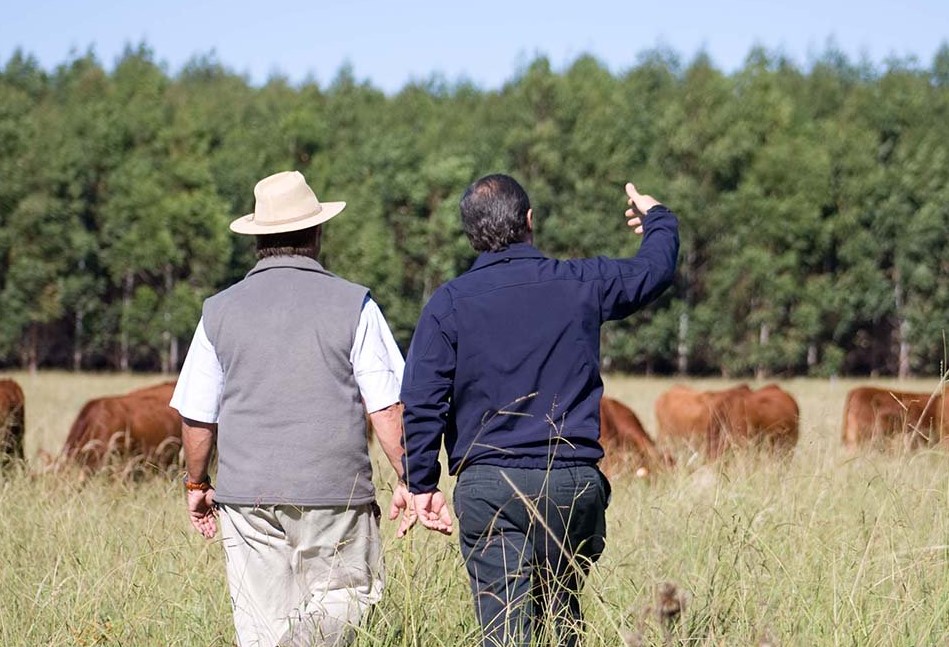- Detalles
- Categoría: El mundo
- Visto: 1550
 Lignin is here to stay
Lignin is here to stay
UPM’s BioPiva™ lignin is a 100% bio-based, renewable substitute for fossil-based materials.
Almost a quarter of the dry mass of each tree is lignin, which is separated in the pulp production process and traditionally used as bioenergy through incineration. New, innovative uses of lignin, however, offer an effective way of reducing environmental impacts of different industries and dependency on fossil materials.
- Detalles
- Categoría: El mundo
- Visto: 1285
 Fomento; a role-model for productive forestry
Fomento; a role-model for productive forestry
More than 650 livestock producers in Uruguay are currently associated with the Fomento Programme, a UPM Forestal Oriental initiative that combines stockbreeding and sustainable forestry.
“We are creating a synergy between two of the most profitable activities in Uruguay”, says Rodrigo Fernández, award-winning Aberdeen Angus breeder and manager of Frigorífico Modelo, one of the Farms participating in UPM Forestal Oriental’s Fomento Programme.
- Detalles
- Categoría: El mundo
- Visto: 1297
 IEA: Why the world needs more modern bioenergy
IEA: Why the world needs more modern bioenergy
Bioenergy usage must be quadrupled by 2060 to mitigate climate change. One key means of achieving this goal is to increase advanced biofuel usage in transport, advocates the International Energy Agency (IEA).
The IEA affirms that modern bioenergy has a key role to play in the fight against global warming and the transition to low-carbon energy. The IEA makes a strong argument in favour of sustainable biofuels in its recent Renewables 2018 report published last October.
- Detalles
- Categoría: El mundo
- Visto: 1257
 Going electric in Changshu
Going electric in Changshu
UPM Changshu paper mill in China is the first company in the region to begin electrifying its logistics chain by starting to use electric vehicles for deliveries.
“This is the next step in our long-term objective to reduce the use of fossil fuels and minimise emissions at the Changshu mill,” says York Fang, UPM Specialty Papers’ Vice President Supply Chain Operations in the Asia Pacific region.
Together with its service provider Total Logistics Company, UPM introduced electric trucks on the mill site in October.
- Detalles
- Categoría: El mundo
- Visto: 1353
 El expolio en los bosques amenaza a las setas, aliadas contra el CO2
El expolio en los bosques amenaza a las setas, aliadas contra el CO2
Los hongos fijan el dióxido de carbono al suelo, uno de los grandes almacenes del gas de efecto invernadero
Los hongos cumplen un papel fundamental en la conservación de la diversidad de los bosques y en su capacidad para mitigar los impactos del cambio climático. “No somos conscientes de que los bosques son como son por la simbiosis que existe entre los árboles y muchas de las setas que nos comemos: níscalos, boletos...
- Detalles
- Categoría: El mundo
- Visto: 1399
 Las reforestaciones en España
Las reforestaciones en España
A la hora de planificar una o varias reforestaciones lo primero que debemos considerar es el objetivo: ¿por qué se hacen? Esto conlleva otras tres cuestiones inmediatas: ¿cuánto?, ¿dónde? y ¿con qué?
Las reforestaciones pueden tener diferentes finalidades, como las siguientes:
El incremento de la biodiversidad
La producción de madera, corcho, frutos, etc
La restauración hidrológico-forestal
La protección del suelo tras un incendio
- Detalles
- Categoría: El mundo
- Visto: 1165
 Luz verde a la ‘Agenda Forestal de Navarra 2019-2023’
Luz verde a la ‘Agenda Forestal de Navarra 2019-2023’
El Gobierno de Navarra ha aprobado la Agenda Forestal de Navarra 2019-2023, un documento que actualiza la estrategia de la política forestal y sus instrumentos de planificación con "criterios de sostenibilidad, equilibrio y calidad medioambiental".
Así lo ha destacado la consejera de Desarrollo Rural y Medio Ambiente, Itziar Gómez, en la rueda de prensa posterior a la sesión del Ejecutivo, en la que ha resaltado que se trata de una "importante actualización por el volumen y por los nuevos criterios introducidos".
